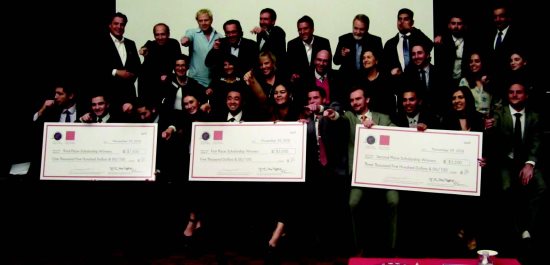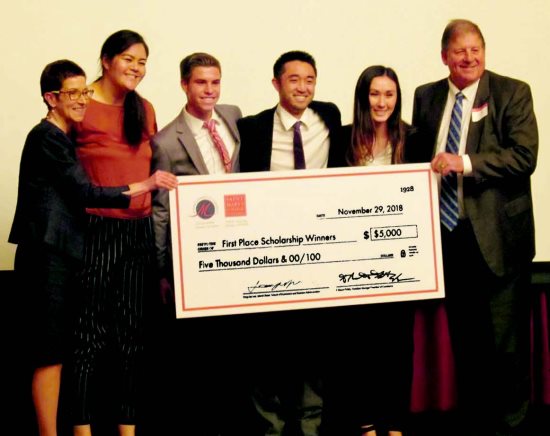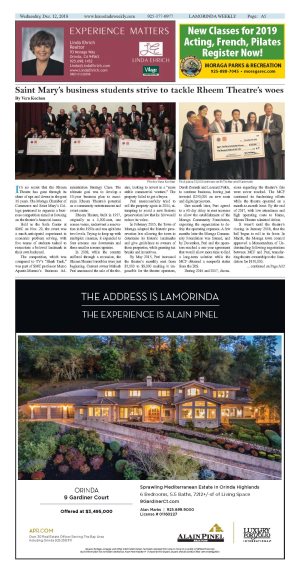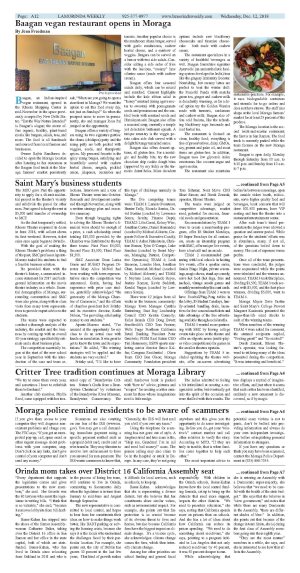| | Published December 12th, 2018
| Saint Mary's business students strive to tackle Rheem Theatre's woes
| | | By Vera Kochan |  | | Photos Vera Kochan |
It's no secret that the Rheem Theatre has gone through its share of ups and downs in the past 10 years. The Moraga Chamber of Commerce and Saint Mary's College partnered to organize a business competition aimed at focusing on the theatre's financial issues.
 Held in the Soda Center at SMC on Nov. 29, the event was a much-anticipated experiment in economic problem solving, with five teams of students tasked to resuscitate a beloved landmark in their own backyard.
Held in the Soda Center at SMC on Nov. 29, the event was a much-anticipated experiment in economic problem solving, with five teams of students tasked to resuscitate a beloved landmark in their own backyard.
 The competition, which was compared to TV's "Shark Tank," was part of SMC professor Marco Aponte-Moreno's Business Administration Strategy Class. The ultimate goal was to develop a 10-year business plan to maximize Rheem Theatre's potential as a community entertainment and event center.
The competition, which was compared to TV's "Shark Tank," was part of SMC professor Marco Aponte-Moreno's Business Administration Strategy Class. The ultimate goal was to develop a 10-year business plan to maximize Rheem Theatre's potential as a community entertainment and event center.
 Rheem Theatre, built in 1957, originally as a 1,000-seat, one screen venue, underwent a renovation in the 1990s and was split into two levels. Trying to keep up with multiplex cinemas, it expanded to four screens: one downstairs and three smaller screens upstairs.
Rheem Theatre, built in 1957, originally as a 1,000-seat, one screen venue, underwent a renovation in the 1990s and was split into two levels. Trying to keep up with multiplex cinemas, it expanded to four screens: one downstairs and three smaller screens upstairs.
 In 2008, while the country suffered through a recession, the Rheem Theatre's troubles were just beginning. Current owner Mahesh Puri announced the sale of the theatre, looking to invest in a "more stable commercial venture." The property failed to get a buyer.
In 2008, while the country suffered through a recession, the Rheem Theatre's troubles were just beginning. Current owner Mahesh Puri announced the sale of the theatre, looking to invest in a "more stable commercial venture." The property failed to get a buyer.
 Puri unsuccessfully tried to sell the property again in 2014, attempting to avoid a new historic preservation law that he felt would reduce its value.
Puri unsuccessfully tried to sell the property again in 2014, attempting to avoid a new historic preservation law that he felt would reduce its value.
 In February 2015, the Town of Moraga adopted the historic preservation law allowing the town to determine its historic landmarks and give guidelines to owners of those properties, while granting tax breaks and incentives.
In February 2015, the Town of Moraga adopted the historic preservation law allowing the town to determine its historic landmarks and give guidelines to owners of those properties, while granting tax breaks and incentives.
 By May 2015, Puri increased the theatre's monthly rent from $5,000 to $8,000 making it impossible for the theatre operators, Derek Zemrak and Leonard Pirkle, to continue business, having just invested $250,000 on new seats and digital projectors.
By May 2015, Puri increased the theatre's monthly rent from $5,000 to $8,000 making it impossible for the theatre operators, Derek Zemrak and Leonard Pirkle, to continue business, having just invested $250,000 on new seats and digital projectors.
 One month later, Puri agreed to a 60-day delay in rent increase to allow the establishment of the Moraga Community Foundation, expecting the organization to defray the operating expenses. A few months later the Moraga Community Foundation was formed, and by December, Puri and the operators reached a one-year agreement that would allow more time to find a long-term solution while the MCF obtained a nonprofit status from the IRS.
One month later, Puri agreed to a 60-day delay in rent increase to allow the establishment of the Moraga Community Foundation, expecting the organization to defray the operating expenses. A few months later the Moraga Community Foundation was formed, and by December, Puri and the operators reached a one-year agreement that would allow more time to find a long-term solution while the MCF obtained a nonprofit status from the IRS.
 During 2016 and 2017, discussions regarding the theatre's fate were never reached. The MCF continued its fundraising efforts while the theatre operated on a month-to-month lease. By the end of 2017, with low attendance and high operating costs to blame, Rheem Theatre admitted defeat.
During 2016 and 2017, discussions regarding the theatre's fate were never reached. The MCF continued its fundraising efforts while the theatre operated on a month-to-month lease. By the end of 2017, with low attendance and high operating costs to blame, Rheem Theatre admitted defeat.
 It wasn't until the theatre's closing in January 2018, that the ball began to roll in its favor. In March, the Moraga town council approved a Memorandum of Understanding following negotiations between MCF and Puri, transferring theatre ownership to the foundation for $150,000. The MOU gave Puri the opportunity to apply for a 48-unit residential project in the theatre's vicinity and subdivide the parcel for other uses. Puri agreed to keep the rent at $5,000 until transfer of ownership to MCF.
It wasn't until the theatre's closing in January 2018, that the ball began to roll in its favor. In March, the Moraga town council approved a Memorandum of Understanding following negotiations between MCF and Puri, transferring theatre ownership to the foundation for $150,000. The MOU gave Puri the opportunity to apply for a 48-unit residential project in the theatre's vicinity and subdivide the parcel for other uses. Puri agreed to keep the rent at $5,000 until transfer of ownership to MCF.
 As the dust temporarily settled, Rheem Theatre reopened its doors in June 2018, with sellout shows its first weekend. However, ticket sales once again began to dwindle.
As the dust temporarily settled, Rheem Theatre reopened its doors in June 2018, with sellout shows its first weekend. However, ticket sales once again began to dwindle.
 With the goal of making the Rheem Theatre's problems a thing of the past, SMC professor Aponte-Moreno tasked his students to find a feasible business solution.
With the goal of making the Rheem Theatre's problems a thing of the past, SMC professor Aponte-Moreno tasked his students to find a feasible business solution.
 He provided them with the theatre's history, a summarized income statement for 2017 and background information on the movie theatre industry as a whole. Essential demographics of Moraga, surrounding communities and SMC were also given, along with in-class visits from many town representatives to provide expert advice to the students.
He provided them with the theatre's history, a summarized income statement for 2017 and background information on the movie theatre industry as a whole. Essential demographics of Moraga, surrounding communities and SMC were also given, along with in-class visits from many town representatives to provide expert advice to the students.
 The teams were expected to conduct a thorough analysis of the industry, the market and the business by coming up with an overall 10-year strategy, a profitability estimate and a short business plan.
The teams were expected to conduct a thorough analysis of the industry, the market and the business by coming up with an overall 10-year strategy, a profitability estimate and a short business plan.
 The competition essentially began at the start of the new school year in September with the introduction of the case and team selections. Interviews and a tour of Rheem Theatre went into October. Research and development continued through November, along with a written strategy plan and executive summary.
The competition essentially began at the start of the new school year in September with the introduction of the case and team selections. Interviews and a tour of Rheem Theatre went into October. Research and development continued through November, along with a written strategy plan and executive summary.
 Even though bragging rights to solving the Rheem Theatre's financial woes should be enough of a prize, a cash scholarship award totaling $10,000 provided by the Chamber was distributed to the top three teams: First Place $5,000; Second Place $3,500; Third Place $1,500.
Even though bragging rights to solving the Rheem Theatre's financial woes should be enough of a prize, a cash scholarship award totaling $10,000 provided by the Chamber was distributed to the top three teams: First Place $5,000; Second Place $3,500; Third Place $1,500.
 SMC Associate Dean Larisa Genin and BUSAD Program Director Mary Alice McNeil had been working with town representatives since the competition was announced. Genin, having had experience with prior case studies, gratefully acknowledged "the generosity of the Moraga Chamber of Commerce," and the efforts of chamber president Bob Fritzky and its executive director, Kathe Nelson, "for providing scholarship money to our students."
SMC Associate Dean Larisa Genin and BUSAD Program Director Mary Alice McNeil had been working with town representatives since the competition was announced. Genin, having had experience with prior case studies, gratefully acknowledged "the generosity of the Moraga Chamber of Commerce," and the efforts of chamber president Bob Fritzky and its executive director, Kathe Nelson, "for providing scholarship money to our students."
 Aponte-Moreno stated, "I'm amazed at the opportunity for my class to do an actual case with hands-on simulation. It was great to get to know the town and its expectations." He added, "The winning strategies will be applied and the students are very excited."
Aponte-Moreno stated, "I'm amazed at the opportunity for my class to do an actual case with hands-on simulation. It was great to get to know the town and its expectations." He added, "The winning strategies will be applied and the students are very excited."
 Fritzky said, "I'd like to have this type of challenge annually in Moraga."
Fritzky said, "I'd like to have this type of challenge annually in Moraga."
 The five competing teams were: TEAM 1: Lauren Overstreet, Hunter Tully, Ricardo Santos, David Bortins (coached by Lawrence Souza, faculty, Finance Dept); TEAM 2: Lilia Corral, Kelsey Wise, Jonathan Cortes, Daniel Hernandez (coached by Michael Alderete, Corporate Fellow & Executive Coach); TEAM 3: Asher Finkelstein, Christian Houser, Tyler O'Campo, Luke Sanchez (coached by Brent Meyers, Managing Partner, Competitive Dynamics); TEAM 4; Leah Emerson, Lourdes Hess, Jonathan Chan, Jeremiah Michael (coached by Michael Alderete), and TEAM 5: Neylene Leon, Gerardo Reyes, Justine Roman, Kevin Sudduth, Kendal Vargas (coached by Lawrence Souza).
The five competing teams were: TEAM 1: Lauren Overstreet, Hunter Tully, Ricardo Santos, David Bortins (coached by Lawrence Souza, faculty, Finance Dept); TEAM 2: Lilia Corral, Kelsey Wise, Jonathan Cortes, Daniel Hernandez (coached by Michael Alderete, Corporate Fellow & Executive Coach); TEAM 3: Asher Finkelstein, Christian Houser, Tyler O'Campo, Luke Sanchez (coached by Brent Meyers, Managing Partner, Competitive Dynamics); TEAM 4; Leah Emerson, Lourdes Hess, Jonathan Chan, Jeremiah Michael (coached by Michael Alderete), and TEAM 5: Neylene Leon, Gerardo Reyes, Justine Roman, Kevin Sudduth, Kendal Vargas (coached by Lawrence Souza).
 There were 12 judges from all walks in the business community: Moraga Town Manager Cynthia Battenberg; East Bay Leadership Council CEO Kristin Connelly; Tailor Brands CEO Doug Ewert; Semifreddi's CEO Tom Frainer; Wells Fargo Northern California Retail Banking President Peter Gruebele; PGIM Real Estate CEO Tim Hennessey; ESPN sports marketing senior director Bruce Kalfus; Compass Residential - Olsen Team CEO Ben Olson; Moraga Community Foundation president Tom Schnurr; Next Move CEO Shari Simon; and Derek Zemrak, operator, Rheem Theatre.
There were 12 judges from all walks in the business community: Moraga Town Manager Cynthia Battenberg; East Bay Leadership Council CEO Kristin Connelly; Tailor Brands CEO Doug Ewert; Semifreddi's CEO Tom Frainer; Wells Fargo Northern California Retail Banking President Peter Gruebele; PGIM Real Estate CEO Tim Hennessey; ESPN sports marketing senior director Bruce Kalfus; Compass Residential - Olsen Team CEO Ben Olson; Moraga Community Foundation president Tom Schnurr; Next Move CEO Shari Simon; and Derek Zemrak, operator, Rheem Theatre.
 The teams were judged on competitive advantage, market need, potential for success, financial needs and presentation.
The teams were judged on competitive advantage, market need, potential for success, financial needs and presentation.
 Recommendations by TEAM 1 were to create a membership program, offer $6 Student Mondays, $5 Super Tuesdays for all customers, create an internship program with SMC, offer unique live events, have a bar/café and an arcade.
Recommendations by TEAM 1 were to create a membership program, offer $6 Student Mondays, $5 Super Tuesdays for all customers, create an internship program with SMC, offer unique live events, have a bar/café and an arcade.
 TEAM 2 recommended partnering with local schools in hosting live events, offer a speaker series, Senior Bingo Night, private screenings, magic shows, stand-up comedy, serve hot food (hot dogs, fries and nachos), vintage arcade games and monthly membership/discount cards.
TEAM 2 recommended partnering with local schools in hosting live events, offer a speaker series, Senior Bingo Night, private screenings, magic shows, stand-up comedy, serve hot food (hot dogs, fries and nachos), vintage arcade games and monthly membership/discount cards.
 Offerings from TEAM 3 were to have Foosball/Ping-Pong tables in the lobby, $5 Student Tuesdays, family-oriented bundling deals, incentives for free concessions/tickets and take advantage of the free advertising available through social media.
Offerings from TEAM 3 were to have Foosball/Ping-Pong tables in the lobby, $5 Student Tuesdays, family-oriented bundling deals, incentives for free concessions/tickets and take advantage of the free advertising available through social media.
 TEAM 4 wanted more partnering with SMC by having college events take place at the theatre and offer an eSports arena (multi-player video competitions) for games in the smaller theatres upstairs.
TEAM 4 wanted more partnering with SMC by having college events take place at the theatre and offer an eSports arena (multi-player video competitions) for games in the smaller theatres upstairs.
 Suggestions by TEAM 5 included updating the theatre website, offer on-screen advertising before/in between screenings, open the outside ticket booth, redecorate, serve higher quality food and beverages, book concerts that will draw 300-500 patrons, have VIP seating and turn the theatre into a restaurant/entertainment center.
Suggestions by TEAM 5 included updating the theatre website, offer on-screen advertising before/in between screenings, open the outside ticket booth, redecorate, serve higher quality food and beverages, book concerts that will draw 300-500 patrons, have VIP seating and turn the theatre into a restaurant/entertainment center.
 After each team's timed presentation the judges were allowed a question and answer period. While praise for the students' efforts was in abundance, many, if not all, of the questions boiled down to money. The cost of expenses verses profits.
After each team's timed presentation the judges were allowed a question and answer period. While praise for the students' efforts was in abundance, many, if not all, of the questions boiled down to money. The cost of expenses verses profits.
 Once all of the team presentations were concluded, the judges were sequestered while the points were tabulated and the winners announced. TEAM 3 took third place, dividing $1,500, TEAM 1 took second with $3,500, and the first place winners, dividing $5,000, went to TEAM 4.
Once all of the team presentations were concluded, the judges were sequestered while the points were tabulated and the winners announced. TEAM 3 took third place, dividing $1,500, TEAM 1 took second with $3,500, and the first place winners, dividing $5,000, went to TEAM 4.
 Moraga Mayor Dave Trotter and Saint Mary's College Provost Margaret Kasimatis presented the larger-than-life sized checks to each of the winning teams.
Moraga Mayor Dave Trotter and Saint Mary's College Provost Margaret Kasimatis presented the larger-than-life sized checks to each of the winning teams.
 When members of the winning TEAM 4 were asked for comment, the stunned recipients replied, "Feeling great!" and "So excited!"
When members of the winning TEAM 4 were asked for comment, the stunned recipients replied, "Feeling great!" and "So excited!"
 Derek Zemrak, Rheem Theatre's operator, was looking forward to utilizing many of the ideas presented during the competition. "It was interesting and beneficial."
Derek Zemrak, Rheem Theatre's operator, was looking forward to utilizing many of the ideas presented during the competition. "It was interesting and beneficial."


|
 | | First place $5,000 winners with Trotter and Kasimatis | | | | | | | | | | | |





